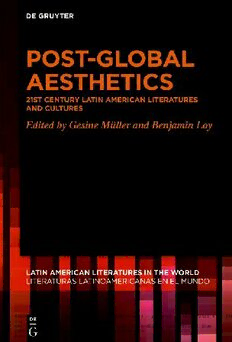Table Of ContentCopyright 2023. De Gruyter. All rights reserved. May not be reproduced in any form without permission from the publisher, except fair uses permitted under U.S. or applicable copyright law. EvACABiNecSa:ncC toO3uu 3rnP8ytu0 :b3L l9avi4tis ich;nti onGArgemi sea:ir nieecB aoMnol klL eiCrto,el rlBaeetcnutjriaeomsni na( nELdBo SyCC.uO;lh toPusortse)ts - -G lporbianlt eAde sotnh e1t2i/c1s1 /:2 02212s t4 :07 PM
Post-GlobalAesthetics
EBSCOhost - printed on 12/11/2022 4:07 PM via . All use subject to https://www.ebsco.com/terms-of-use
Latin American Literatures
in the World
Literaturas Latinoamericanas
en el Mundo
Edited by / Editado por
Gesine Müller
Editorial Board
AnaGallego(Granada)
GustavoGuerrero(Paris)
HéctorHoyos(Stanford)
IgnacioSánchezPrado(St.Louis)
MarianoSiskind(Harvard)
PatriciaTrujillo(Bogotá)
Volume 14 / Volumen 14
EBSCOhost - printed on 12/11/2022 4:07 PM via . All use subject to https://www.ebsco.com/terms-of-use
Post-Global
Aesthetics
21st Century Latin American Literatures and Cultures
Edited by
Gesine Müller and Benjamin Loy
EBSCOhost - printed on 12/11/2022 4:07 PM via . All use subject to https://www.ebsco.com/terms-of-use
ThisprojecthasreceivedfundingfromtheEuropeanResearchCouncil(ERC)undertheEuropean
Union’sHorizon2020ResearchandInnovationprogramme–GrantAgreementNumber646714
ISBN978-3-11-076161-0
e-ISBN(PDF)978-3-11-076214-3
e-ISBN(EPUB)978-3-11-076221-1
ISSN2513-0757
DOIhttps://doi.org/10.1515/9783110762143
ThisworkislicensedundertheCreativeCommonsAttribution-NonCommercial-NoDerivatives4.0
InternationalLicense.Fordetailsgotohttps://creativecommons.org/licenses/by-nc-nd/4.0/.
CreativeCommonslicensetermsforre-usedonotapplytoanycontent(suchasgraphs,
figures,photos,excerpts,etc.)notoriginaltotheOpenAccesspublicationandfurther
permissionmayberequiredfromtherightsholder.Theobligationtoresearchandclear
permissionliessolelywiththepartyre-usingthematerial.
LibraryofCongressControlNumber:2022940838
BibliographicinformationpublishedbytheDeutscheNationalbibliothek
TheDeutscheNationalbibliothekliststhispublicationintheDeutscheNationalbibliografie;
detailedbibliographicdataareavailableontheinternetathttp://dnb.dnb.de.
©2023theauthor(s),publishedbyWalterdeGruyterGmbH,Berlin/Boston
Thebookispublishedopenaccessatwww.degruyter.com.
Typesetting:IntegraSoftwareServicesPvt.Ltd.
Printingandbinding:CPIbooksGmbH,Leck
www.degruyter.com
EBSCOhost - printed on 12/11/2022 4:07 PM via . All use subject to https://www.ebsco.com/terms-of-use
Contents
BenjaminLoy(UniversityofVienna)andGesineMüller(University
ofCologne)
TowardsaPost-GlobalAge:IntroductoryNotesabouttheEnd(s)
ofGlobalizationandWorldLiterature 1
1 ApproachingthePost-Global (fromLatinAmerican
Perspectives)
GesineMüller(UniversityofCologne)
ThePost-GlobalChallengeintheDebateoverWorldLiterature:
LatinAmericanPerspectives 11
AlexisRadisoglou(DurhamUniversity)
EthnoplanetarityasPost-Globality:FourThesesandaPostscript
onaContemporaryDecolonialConstellation 29
JorgeJ.Locane(UniversityofOslo)
Sobreelmundo,sobreelimperio:notasconjeturalesparapensareltono
apocalípticodeciertashumanidadesactuales 45
RominaWainberg(StanfordUniversity)
WritingaboutWritingAmidsttheEndofWorlds:AnInvitation 61
2AnthropoceneNarrativesI:Geo-Poetics
UrsulaK.Heise(UniversityofCalifornia,LosAngeles)
TheVanishingMetropolis:EnvironmentalJusticeandUrbanNarrative
inLatinAmerica 77
JobstWelge(UniversityofLeipzig)
Post-NaturalHistories:MimicryandDeepTimeinPolaOloixarac’s
LasConstelacionesOscurasandCarlosFonseca’sMuseoAnimal 95
EBSCOhost - printed on 12/11/2022 4:07 PM via . All use subject to https://www.ebsco.com/terms-of-use
VI Contents
JennyHaase(UniversityofHalle-Wittenberg)
“Paracontartedelaisla”:entrelazamientoscorporales,ecológicosy
económicosenlapoesíadeRosabettyMuñoz 115
3AnthropoceneNarrativesII:Exhausted Resources
NicolásCampisi(GeorgetownUniversity)
DocumentaryMines:ArchivesofEcohorrorintheAnthropocene 131
AzucenaCastro(StockholmUniversity/UniversityofBuenosAires)
andLuisI.Prádanos(MiamiUniversity)
Retosestéticosdelpostdesarrollo:imaginariosnoextractivosyfuturos
postfósilesenmediosculturalesandinos 149
JanKnobloch(UniversityofCologne)
GlobalizationReversed:ReadingScalesofCollapseinPedroMairal’s
Elañodeldesierto 169
4 DigitalWorlds: TrendsandTraps
CarolinaGainzaC.(UniversidadDiegoPortales/SantiagodeChile)
Pensarlacondicióndigitaldesdelaliteraturadigitallatinoamericana:
apropiaciones,decolonizaciónytecnodiversidad 191
CarolinaFerrer(UniversitéduQuébecàMontréal)
Convergenciasydivergenciasdelaglobalizaciónylashumanidades
digitales:constitución,circulaciónydesaparicióndetendencias
conceptuales 209
BenjaminLoy(UniversityofVienna)
Lanovela(post-)globalcomotrampa:Kentukis(2018)deSamanta
Schweblin 223
EBSCOhost - printed on 12/11/2022 4:07 PM via . All use subject to https://www.ebsco.com/terms-of-use
Contents VII
5NewNarrativesof MigrationandDisplacement
GustavoGuerrero(UniversitéParis-Seine)
Perderelmundo:lapoesíavenezolanaantelaexperienciadela
migración 249
IgnacioM.SánchezPrado(WashingtonUniversity,St.Louis)
México,EstadosUnidosylaerapost-global:Delaculturafronterizaala
nuevacuestiónbinacional 259
EBSCOhost - printed on 12/11/2022 4:07 PM via . All use subject to https://www.ebsco.com/terms-of-use
EBSCOhost - printed on 12/11/2022 4:07 PM via . All use subject to https://www.ebsco.com/terms-of-use
BenjaminLoyand Gesine Müller
Towards a Post-Global Age
IntroductoryNotes abouttheEnd(s) ofGlobalization
andWorld Literature
Thinking about how to approach the question, “What comes after globaliza-
tion?”shapedearlydeliberationsaroundthisbookprojectinearly2020.Ideas
about what a post-global world might look like departed from the increasing
indications of a fundamental historical shift: after thirty years of shaping the
world,thecurrentphaseofacceleratedglobalizationappearedtobecomingto
anend.However,ifatthatmomentourreflectionsfocusedonphenomenasuch
as climate change, global migrations and inequality, and the surge of neona-
tionalismacrosstheglobe,nobodycouldpresagehowthesoontofollowevents
oftheCovid-19pandemicandthewarinUkrainewouldintensifythisnotionof
findingourselvesatahistoricalthreshold,wheretheexhaustionoftheglobal-
istprojectbecomesevidentonceandforall.
From 1989 onwards, the historical present has undoubtedly been domi-
natedbyoptimisticandprogressivediscoursesofall-embracingglobalintegra-
tion, borne by the ideals of economic and social liberalization (King 2017). It
has also been steeped in optimism, both in terms of the philosophy of history
(Fukuyama1992)andintermsoftechnology,aspromotedbythedigitalrevolu-
tion. However, since at least the turn of the millennium, the dark sides and
asymmetries of what Ulrich Beck has termed the “world risk society” (Beck
1999) – with its globally networked societies, economies, and cultures – have
alsogrownmoreandmoreapparent(Stiglitz2002,Appadurai2006,Hirstetal.
2009, Turek 2017, Diamond 2018, Hüther et al. 2019). Today, there are unmis-
takable, fundamental cracks in the formerly hegemonic manner in which the
world has been ordered and perceived from a Western perspective. Over the
past fifteen years, wide-ranging developments have debunked the optimistic
paradigm of globalism – whose manifold inequalities and dead ends certainly
have been glaringly visible for most of the world’s population since 1989. It is
telling that only with the accelerated succession of global crisis also affecting
the Western centers of this globalist optimism – financial crises, epidemics,
militaryconflicts,andnewwavesofbothmigrationanddisplacement–anew
processofreflectiononthepastdecadeshasbeentriggered.
BenjaminLoy,UniversityofVienna
GesineMüller,UniversityofCologne
OpenAccess.©2023theauthor(s),publishedbyDeGruyter. Thisworkislicensedunder
theCreativeCommonsAttribution-NonCommercial-NoDerivatives4.0InternationalLicense.
https://doi.org/10.1515/9783110762143-001
EBSCOhost - printed on 12/11/2022 4:07 PM via . All use subject to https://www.ebsco.com/terms-of-use

